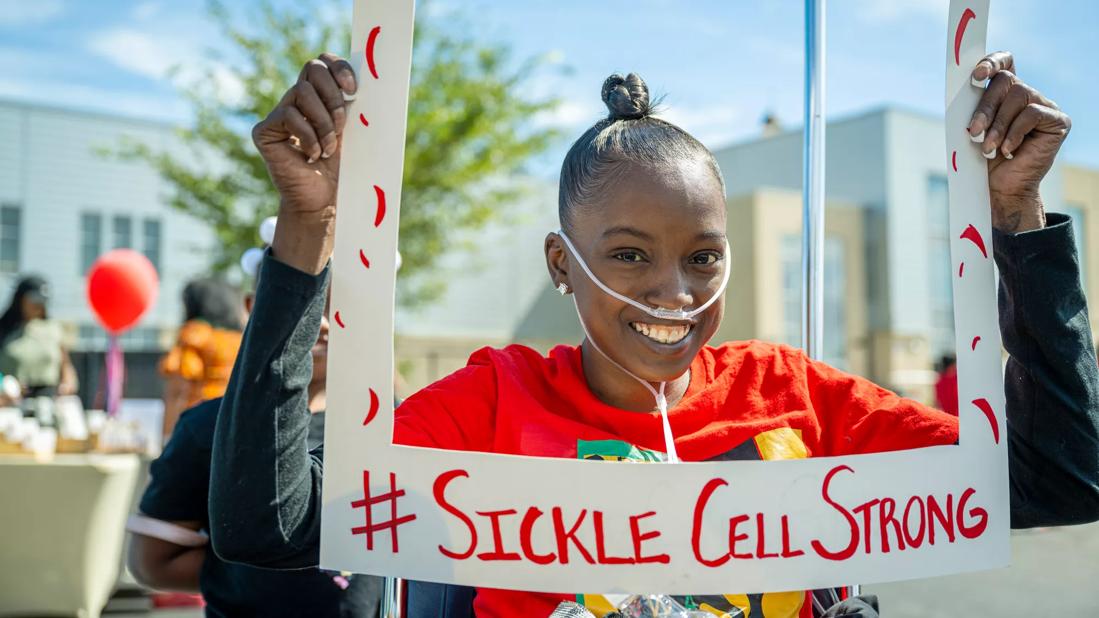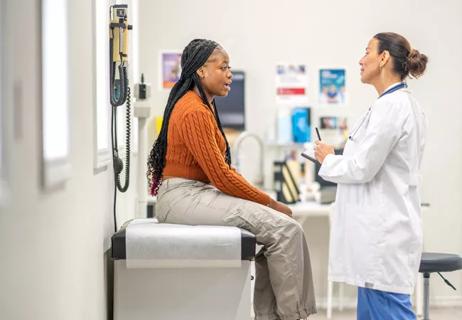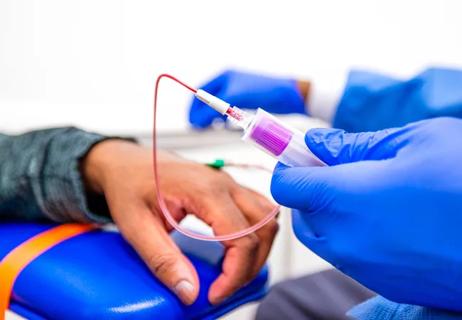Nurses play key role in comprehensive lifetime treatment program

Although great strides have been made to reduce mortality and morbidity in children with sickle cell disease (SCD), the period during which patients transition from pediatric to adult care is one of intense vulnerability. Experts recommend young adults with chronic health conditions like SCD transfer to adult-centered care within 6 months of their last pediatric visit. Unfortunately, the process can be complex and daunting, leading to dangerous disruptions in care.
Advertisement
Cleveland Clinic is a non-profit academic medical center. Advertising on our site helps support our mission. We do not endorse non-Cleveland Clinic products or services. Policy
To bridge this gap and improve the quality of life for those with SCD, Cleveland Clinic has created a “medical neighborhood” designed to provide long-term, comprehensive treatment for a patient’s entire life span. Launched in 2022 and co-housed at five different Cleveland Clinic facilities, the program currently serves 172 patients aged less than one year to 77 years.
“Even though SCD is the most common blood disorder in the world, there really hasn’t been a lot of support out there for those who suffer from the disease; they’ve been disenfranchised,” says Kristin Seastrand, BSN, RN, CPN, Sickle Cell Care Coordinator, Main Campus. “Furthermore, as patients with SCD age, their needs change – and healthcare hasn’t always been prepared to address those shifts. We’re determined to change that.”
Sickle cell disease is an inherited blood disorder that causes normally round red blood cells to become deformed into a “sickle” shape. The compromised cells are more rigid and aggregate easily, which can lead to excruciating vaso-occlusive pain that often arises suddenly and unpredictably. If left unmanaged, the disease can lead to organ failure and early death.
The condition also carries numerous long-term health risks, including stroke, blood clots, chronic pain, avascular necrosis and pulmonary hypertension. Patients living with SCD typically have substantial medical and psychological needs; in some cases, they require social and economic support. More than 93% are Black.
Nurses like Seastrand and fellow care coordinator Katrina Seedhouse, BSN, RN, are an integral part of the neighborhood’s core care team, which also includes two hematologists, an advanced practice nurse, two social workers and two patient navigators. Additional clinical partners include Cleveland Clinic specialists in adolescent medicine, obstetrics and gynecology, fertility, urology, pulmonology, nephrology, vascular medicine, orthopedic surgery, genetics, nutrition, neurology/cerebrovascular care, cardiology and more.
Advertisement
In addition to facilitating clear communication between patients and their providers, Seastrand and Seedhouse help arrange virtual visits and facilitate appointments with specialists. They also help patients obtain insurance coverage and prior authorization for newer medications.
“We try to ensure that our patients attend their appointments and have the medications they need,” says Seastrand. “If we haven't heard from someone in a while, we do proactive outreaches and check-ins to see how they're doing. In addition, if a patient needs to be admitted, we encourage them to call us before going to the hospital. We want to be there to provide support. We also follow up frequently to see if there’s anything we can do to help them on an outpatient basis.”
The care coordinators also help patients navigate the Family and Medical Leave Act and initiate Individualized Education Plans or Section 504 plans for young patients who attend school. “We write letters to the schools to make sure our patients have water bottles available in the classroom and are permitted to wear a jacket if they need to,” Seastrand explains.
The social work team assists patients with issues that extend beyond SCD. In addition to providing behavioral health needs assessments, they also address social drivers of health such as food insecurity, financial concerns, housing, and transportation.
Seastrand also runs a quarterly comprehensive clinic day, during which a small, select group of patients can be seen and treated by a variety of different specialists at once. “We want to make clinic visits as convenient as possible for patients and their families, so we aim to address their concerns in one half-day,” she says.
Advertisement
Cleveland Clinic was a site for the pivotal trial of two new gene therapies that were recently approved by the U.S. Food and Drug Administration for people with SCD aged 12 and older. Two of the study continue to be treated in the neighborhood.
“It’s very exciting to have access to these new, potentially curative treatments, but we still don't know where these patients’ paths will take them,” says Seastrand. “For now, we will continue to follow them to ensure they are staying well and aren't facing any other issues,”
Even with advanced treatment, patients with SCD may continue to suffer serious complications, including avascular necrosis or organ damage. Genetic counseling is also important for those who wish to conceive a child. “It’s important for our patients to know that the neighborhood will be here to support them every step of the way,” she adds.
Seastrand, who works with her team and other volunteer Cleveland Clinic caregivers to plan special SCD awareness events throughout the year, finds her job fulfilling. “I continue to learn new things every day,” she says. “It is truly a privilege to advocate for my patients, many of whom have been historically disenfranchised. I am very proud of the work that my team does to break down barriers, and I'm excited to see what the future holds.”
Advertisement
Advertisement

Interim results of RUBY study also indicate improved physical function and quality of life

Integrated care model reduces length of stay, improves outpatient pain management

New course offers insights into clinical, psychosocial and ethical dimensions of care

Watch for sudden unilateral vision loss without pain

Efficacy, safety and tolerability data shared at hematology meeting

How to combat the rise in mortality when patients become adults

Two-year event-free survival comparable to matched sibling donor myeloablative transplant

First-in-human trials of CRISPR-Cas12a gene editing demonstrate safety and meaningful event-free survival